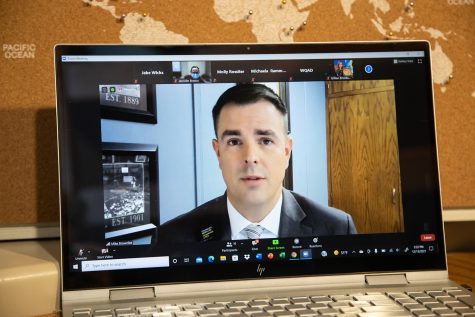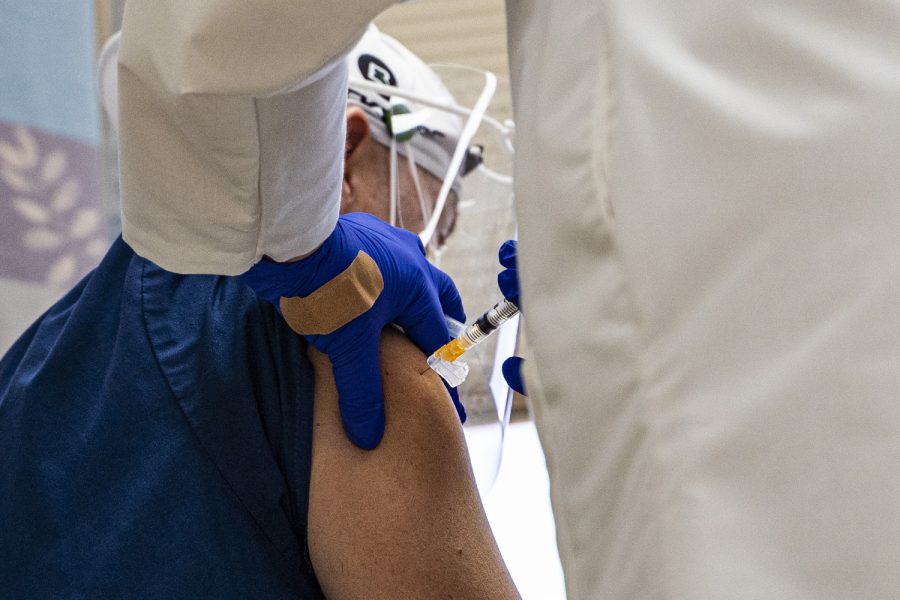UI Hospitals and Clinics mark one year of COVID-19 vaccines
University of Iowa Health Care celebrates the one-year anniversary of vaccinating the first people in the state, reminding community members to continue to get vaccinated and receive booster shots.
Shivansh Ahuja for The Daily Iow
Patients are injected with the COVID-19 vaccine at the VA Medical Center in Iowa City on Tuesday, Dec. 22, 2020. The center received the Modern vaccine for its employees.
December 13, 2021
One year ago, 178 University of Iowa Health Care employees were the first in Iowa and among the first in the nation to receive COVID-19 vaccines.
Close to 2 million Iowans have been vaccinated since a year ago, leading to thousands of lives saved and millions protected against the virus, Molly Rossiter, Communications Specialist for UI Hospitals & Clinics, said in a press release.
The first day of vaccinations on Dec. 14, 2020, was an important milestone during the pandemic, Suresh Gunasekaran, chief executive officer at UI Hospitals & Clinics said in the release.
“This was an exciting and joyous day, providing a much-needed spark of hope for our staff during the darkest days of the pandemic,” Gunasekaran said. “We are thankful and proud that our staff were among the first to receive the vaccine, one of the many ways we have led the way throughout the pandemic.”
UI Health Care was the site of many COVID-19 vaccine trials, including the Novavax, inc. trial, which started at the beginning of this year. UI Health Care also worked on a study in October that confirmed the effectiveness of the Pfizer and Moderna vaccines through research in health care settings.
Mike Brownlee, UIHC chief pharmacy officer and co-leader of all UIHC employee and community vaccination efforts to date, said in a press conference on Monday that 92 percent of UIHC employees are vaccinated. In February, over 73 percent of the staff was vaccinated, he said.

“The biggest challenge to get this number to 100 percent is the sheer amount of misinformation out there,” Brownlee said. “People need to know where they can get accurate information, which is with their health care providers.”
UI Health Care is now working to vaccinate the broader community, including thousands of Iowans from ages five to 65+, Rossiter said. The hospital provides COVID-19 vaccinations through vaccination clinics in Johnson County by appointment, she said.
More than 200 million Americans and over 4 billion people across the globe have been safely vaccinated, Rossiter said.
Many parts of the state, including Johnson County, remain areas of high transmission rates, according to the Centers for Disease Control and Prevention.
Health experts aren’t sure what percentage of the population needs to be vaccinated for herd immunity to occur, but Brownlee said it’s likely to be more than 80 percent.
According to ABC News, the omicron variant has been detected in at least 16 states in the U.S., which highlights the importance of getting vaccinated and receiving boosters.
The first confirmed case of the COVID-19 omicron variant was reported in Iowa by the State Hygienic Lab and Iowa Department of Public Health on Dec. 9.
Brownlee said the best way to combat the virus is through continued vaccination efforts.
“The good news is that we have made substantial progress in getting the public vaccinated, so even as new COVID-19 variants arrive, we will not go back to square one,” Brownlee said. “Our experts believe it is likely that existing vaccines will continue to be highly effective at preventing severe disease and hospitalizations from COVID-19, even with the emergence of omicron and other variants.”
The only way to end the pandemic is for people to get vaccinated, Gunasekaran said. It’s important also to get boosters, wear masks, and social distance, he said.
“We must work together as a collective whole to end this pandemic, and we should celebrate how far we have come and how many people have gotten vaccinated this past year to protect themselves and others,” Gunasekaran said in the release. “Each additional person who gets a vaccine brings us one step closer to the end of the pandemic, and that is a very good reason to be hopeful about the future.”
Correction: The Daily Iowan incorrectly reported that more than 200 million Americans and over 4 billion people across the globe have not been vaccinated. The DI corrected the article to now read that more than 200 million Americans and over 4 billion people across the globe have been vaccinated. The article also indicates that UIHC provides walk-in vaccination clinics, but all sites giving vaccinations require appointments. The DI regrets these errors.







